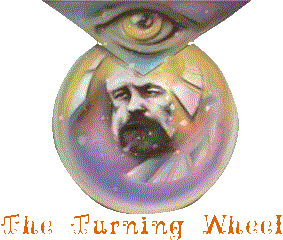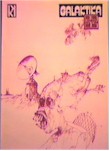

TTHC 389: Manuscript received at SMLA July 8, 1953
| Previous | 59 | Next |
| The Golden Man | Chronology | The Last Of The Masters |
(1954): SF STORIES #2
(1955): A HANDFUL OF DARKNESS, Rich & Cowan, hb
 |
(1965): NOW & BEYOND {Ed.: Howard} Belmont, pb, B50-646, $0.50 |
(1973): THE BOOK OF PKD, DAW, pb, #44
 |
(1983): GALAKTIKA 52, {tr. into Hungarian as A SORS KEREKE} |
(1987): THE FATHER-THING
(1987): IMPERIAL STARS, VOL.2: REPUBLIC AND EMPIRE {Ed.: Pournelle} Baen
(1991): SECOND VARIETY, Citadel Twilight only
![]()
SRG 43
"The Turning Wheel" heralds in the title a change of different sort. In this future alternate possibility the gap between philosophy and technology seems unbridgeable. After a devastating 500 years of manmade destiny, the Bards now rule by a mystical philosophy, relegating human reason to a low status and technological knowledge to the low-caste Technos in the ghetto of society. As the existent machines of communication and transportation gradually wear out, the political power of the Bards becomes more tenuous. Opposition grows as the Tinkerists, a cult-like group devoted to the care of machinery, attracts support from the more populous Technos. To the Bards this forebodes Yeats' "rough beast, it's time come round at last," but for the Tinkers it is the future inevitable as the turning wheel of the endless cycle of human existence moves them upward to power.
TTHC 244: Hubbard, {...}, was a writer the teenage Phil Dick had admired. Dianetics, advertising itself as a radical new means of psychotherapy by which subjects could rapidly rid themselves of past traumas, was launched in 1950 with a heavily promoted spread in John W. Campbell's Astounding. A.E. Van Vogt, another sf writer whose works had greatly affected Dick, was one of many individuals who became actively involved in the Dianetics crusade. Dorothy Hudner {PKD's mom} was another. "When Dorothy was interested in Dianetics," says Kleo, "she tried to get us interested too. The main problem was that Philip had been familiar with the writing of L. Ron Hubbard when he was a lousy science fiction writer, and it was pretty hard to take seriously anything that he was doing." (Phil may have admired "Fear" and others of Hubbard's writings, but by the time he wrote his 1954 short story "The Turning Wheel" he was ridiculing "Elron Hu" as founder of a worldwide religion -- which Dianetics evolved into as Scientology.)